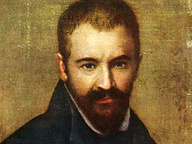Robert Motherwell: Early Collages
![Robert Motherwell, Personaggio (Autoritratto) (Personage [Autoportrait]), 1943. Collezione Peggy Guggenheim, Venezia Robert Motherwell, Personaggio (Autoritratto) (Personage [Autoportrait]), 1943. Collezione Peggy Guggenheim, Venezia](https://www.arte.it/foto/600x450/b8/15555-motherwell.jpg)
Robert Motherwell, Personaggio (Autoritratto) (Personage [Autoportrait]), 1943. Collezione Peggy Guggenheim, Venezia
From 26 May 2013 to 8 September 2013
Venice
Place: Collezione Peggy Guggenheim
Address: Dorsoduro 701
Times: 10 AM - 6 PM (closed on tuesdays)
Responsibles: Susan Davidson
Organizers:
- Terra Foundation for American Art
- Dedalus Foundation
Ticket price: intero € 14, ridotto € 11 oltre i 65 anni, € 8 studenti
Telefono per informazioni: +390412405411
E-Mail info: info@guggenheim-venice.it
Official site: http://www.guggenheim-venice.it
The Peggy Guggenheim Collection presents Robert Motherwell: Early Collages (May 26 - September 8, 2013) curated by Susan Davidson. This exhibition is devoted exclusively to early collages and related works on paper produced by Robert Motherwell (Aberdeen, Washington 1915 - Cape Cod, Massachusetts 1991), one of the leading figures of American Abstract Expressionism, during the first decade of his career, from 1941 to 1951. Motherwell has been the subject of several comprehensive retrospectives organized around the globe that have acknowledged the critical role of collage in Motherwell’s oeuvre but have not paid any special attention to his pioneering work in this essential medium. Robert Motherwell: Early Collages is in fact the first presentation to extensively chronicle his artistic beginnings through the lens of his revelatory encounter with the papier collé technique, which Motherwell described in 1944 as “the greatest of our [art] discoveries.”
Featuring forty-four works from renowned museums and private collections from across Europe and the US, the exhibition also honors Peggy Guggenheim. Friendship, patronage, stimulus, and promotion were all components of Peggy’s manifold generosity to Motherwell as well as to other Americans while still in their formative years as artists. In fact, Peggy Guggenheim’s catalytic impact on Motherwell’s development is typical of her crucial role in New York’s 1940s art scene. Thanks to her encouragement and under the tutelage of Chilean Surrealist artist Matta (Roberto Antonio Sebastián Matta Echaurren), Motherwell first experimented with collage in 1943. As he recalled years later, “I might never have done it otherwise, and it was here that I found […] my ‘identity’.” Motherwell’s earliest papier collé works were featured in Exhibition of Collage, the first international presentation of collage in the United States. This groundbreaking show was held at Peggy Guggenheim’s Art of This Century museum-gallery in spring 1943. On this occasion, Motherwell displayed his works next to other European artists who were working with collage, such as Henri Matisse, Pablo Picasso and Kurt Schwitters. Little more than a year later, in autumn 1944, Peggy mounted Motherwell’s first solo US exhibition, which proved to be one of the largest shows in the history of Art of This Century. James Johnson Sweeney, director of the Solomon R. Guggenheim Museum from 1952 to 1960, authored the introduction to the accompanying brochure. Over the next decade, Motherwell’s production of large-scale collages even outpaced his creation of paintings; his enthusiasm for and dedication to the collage technique for the remainder of his career sets Motherwell apart from other artists of his generation.
The genesis of Motherwell’s career coincided with a peculiar and turbulent period for the US, the 1940s, when the country entered the Second World War following the Japanese attack on Pearl Harbor on December 7, 1941. It is in this socio-political context that Motherwell engaged with themes of symbolic violence and humanitarian struggle. This preoccupation especially came to the fore in his pioneering work in the collage medium beginning in 1943, from his application of evocative titles to the very process of tearing pieces of paper — an aggressive act Motherwell likened to “killing someone.” Moving freely between spontaneous abstraction and semi-representation, between abstract figures (Personage (Autoportrait), 1943) and pure abstraction (Untitled, 1943), Motherwell incorporated at times fragmented military maps and resistance slogans (Viva, 1946), prison bar motifs (Jeune Fille, 1944), and wounded “stick figures” (Three figures shot, 1944). Motherwell thus developed an artistic means of grappling with the madness of the socio-political situation of his day, as well as a way to express his personal anxieties as a fledging artist in a vast, new city like New York. By cutting, tearing, and layering pasted papers, Motherwell reflected the tumult and violence of the modern world, which established him as an essential and original voice in postwar American art.
Robert Motherwell: Early Collagesis accompanied by a fully illustrated catalogue (Guggenheim Publications) that will offer a vital reassessment of Motherwell’s work in the collage medium. Susan Davidson, Senior Curator, Collections and Exhibitions, at the New York Solomon R. Guggenheim Museum will contribute an introduction that focuses on the artist’s early professional relationship with Peggy Guggenheim and Motherwell’s engagement with the exiled Surrealists and the burgeoning Abstract Expressionist group in New York in the 1940s. Megan Fontanella, Associate Curator, Collections and Provenance, Guggenheim Museum, will examine Motherwell’s early works that address themes of death, violence, and political struggle within the context of the socio-political climate of World War II America. Brandon Taylor, Professor Emeritus of History of Art, University of Southampton, United Kingdom, will investigate the history of collage, tracing its origins from the Cubist work of Georges Braque and Pablo Picasso in 1912 to the resurgence of interest in papier collé in the 1940s. This exhibition will also be the occasion for the first in-depth study and technical analysis of Motherwell’s early materials and working methods by Jeffrey Warda, Conservator, Paper, Guggenheim Museum, in what is anticipated to be an indispensable guide for the future preservation of Motherwell’s collages from this period.
Robert Motherwell: Early Collages is generously supported by the Terra Foundation for American Art, with additional funding from the Dedalus Foundation. The Leadership Committee is gratefully acknowledged for its support, including Gilbert and Shelley Harrison, Dorothy and Sidney Kohl, and Louisa Stude Sarofim. The exhibition is also supported by Intrapresae Collezione Guggenheim. The organizers are grateful for the collaboration of the Corriere della Sera and to Radio Italia as media partners. Hangar Design Group designed the exhibition’s publicity materials. Programs auxiliary to the exhibition are supported by the Fondazione Araldi Guinetti, Vaduz. After Venice, the exhibition will be on display at the Solomon R. Guggenheim Museum, New York (September 27, 2013 – January 5, 2014).
Featuring forty-four works from renowned museums and private collections from across Europe and the US, the exhibition also honors Peggy Guggenheim. Friendship, patronage, stimulus, and promotion were all components of Peggy’s manifold generosity to Motherwell as well as to other Americans while still in their formative years as artists. In fact, Peggy Guggenheim’s catalytic impact on Motherwell’s development is typical of her crucial role in New York’s 1940s art scene. Thanks to her encouragement and under the tutelage of Chilean Surrealist artist Matta (Roberto Antonio Sebastián Matta Echaurren), Motherwell first experimented with collage in 1943. As he recalled years later, “I might never have done it otherwise, and it was here that I found […] my ‘identity’.” Motherwell’s earliest papier collé works were featured in Exhibition of Collage, the first international presentation of collage in the United States. This groundbreaking show was held at Peggy Guggenheim’s Art of This Century museum-gallery in spring 1943. On this occasion, Motherwell displayed his works next to other European artists who were working with collage, such as Henri Matisse, Pablo Picasso and Kurt Schwitters. Little more than a year later, in autumn 1944, Peggy mounted Motherwell’s first solo US exhibition, which proved to be one of the largest shows in the history of Art of This Century. James Johnson Sweeney, director of the Solomon R. Guggenheim Museum from 1952 to 1960, authored the introduction to the accompanying brochure. Over the next decade, Motherwell’s production of large-scale collages even outpaced his creation of paintings; his enthusiasm for and dedication to the collage technique for the remainder of his career sets Motherwell apart from other artists of his generation.
The genesis of Motherwell’s career coincided with a peculiar and turbulent period for the US, the 1940s, when the country entered the Second World War following the Japanese attack on Pearl Harbor on December 7, 1941. It is in this socio-political context that Motherwell engaged with themes of symbolic violence and humanitarian struggle. This preoccupation especially came to the fore in his pioneering work in the collage medium beginning in 1943, from his application of evocative titles to the very process of tearing pieces of paper — an aggressive act Motherwell likened to “killing someone.” Moving freely between spontaneous abstraction and semi-representation, between abstract figures (Personage (Autoportrait), 1943) and pure abstraction (Untitled, 1943), Motherwell incorporated at times fragmented military maps and resistance slogans (Viva, 1946), prison bar motifs (Jeune Fille, 1944), and wounded “stick figures” (Three figures shot, 1944). Motherwell thus developed an artistic means of grappling with the madness of the socio-political situation of his day, as well as a way to express his personal anxieties as a fledging artist in a vast, new city like New York. By cutting, tearing, and layering pasted papers, Motherwell reflected the tumult and violence of the modern world, which established him as an essential and original voice in postwar American art.
Robert Motherwell: Early Collagesis accompanied by a fully illustrated catalogue (Guggenheim Publications) that will offer a vital reassessment of Motherwell’s work in the collage medium. Susan Davidson, Senior Curator, Collections and Exhibitions, at the New York Solomon R. Guggenheim Museum will contribute an introduction that focuses on the artist’s early professional relationship with Peggy Guggenheim and Motherwell’s engagement with the exiled Surrealists and the burgeoning Abstract Expressionist group in New York in the 1940s. Megan Fontanella, Associate Curator, Collections and Provenance, Guggenheim Museum, will examine Motherwell’s early works that address themes of death, violence, and political struggle within the context of the socio-political climate of World War II America. Brandon Taylor, Professor Emeritus of History of Art, University of Southampton, United Kingdom, will investigate the history of collage, tracing its origins from the Cubist work of Georges Braque and Pablo Picasso in 1912 to the resurgence of interest in papier collé in the 1940s. This exhibition will also be the occasion for the first in-depth study and technical analysis of Motherwell’s early materials and working methods by Jeffrey Warda, Conservator, Paper, Guggenheim Museum, in what is anticipated to be an indispensable guide for the future preservation of Motherwell’s collages from this period.
Robert Motherwell: Early Collages is generously supported by the Terra Foundation for American Art, with additional funding from the Dedalus Foundation. The Leadership Committee is gratefully acknowledged for its support, including Gilbert and Shelley Harrison, Dorothy and Sidney Kohl, and Louisa Stude Sarofim. The exhibition is also supported by Intrapresae Collezione Guggenheim. The organizers are grateful for the collaboration of the Corriere della Sera and to Radio Italia as media partners. Hangar Design Group designed the exhibition’s publicity materials. Programs auxiliary to the exhibition are supported by the Fondazione Araldi Guinetti, Vaduz. After Venice, the exhibition will be on display at the Solomon R. Guggenheim Museum, New York (September 27, 2013 – January 5, 2014).
SCARICA IL COMUNICATO IN PDF
COMMENTI

-
 Dal 17 July 2025 al 2 November 2025
Cortona | Sedi varie
Dal 17 July 2025 al 2 November 2025
Cortona | Sedi varie
-
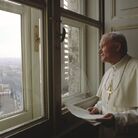 Dal 17 July 2025 al 30 November 2025
Roma | Museo Nazionale di Castel Sant’Angelo
Dal 17 July 2025 al 30 November 2025
Roma | Museo Nazionale di Castel Sant’Angelo
-
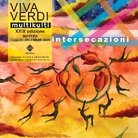 Dal 15 July 2025 al 19 December 2025
Matera | Sedi varie
Dal 15 July 2025 al 19 December 2025
Matera | Sedi varie
-
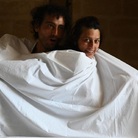 Dal 15 July 2025 al 21 July 2025
Matera | Fondazione Le Monacelle
Dal 15 July 2025 al 21 July 2025
Matera | Fondazione Le Monacelle
-
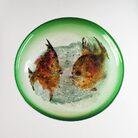 Dal 12 July 2025 al 24 November 2025
Venezia | Museo del Vetro
Dal 12 July 2025 al 24 November 2025
Venezia | Museo del Vetro
-
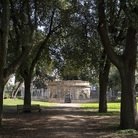 Dal 11 July 2025 al 21 September 2025
Roma | Loggia dei Vini - Villa Borghese
Dal 11 July 2025 al 21 September 2025
Roma | Loggia dei Vini - Villa Borghese
